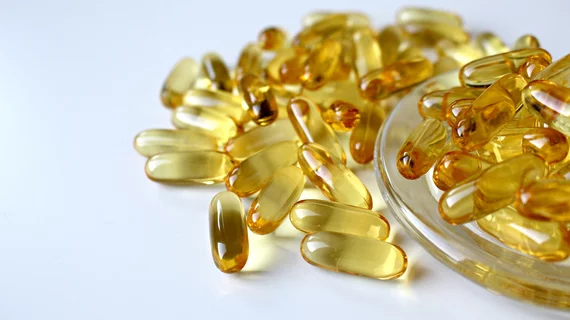Fish oil, garlic and other ‘heart-healthy’ dietary supplements do not improve cholesterol levels
Many dietary supplements claim to improve a person’s heart health, but can any of them make an impact on cholesterol levels? A team of specialists aimed to find out, tracking the impact of six popular supplements on low-density lipoprotein cholesterol (LDL-C) after 28 days of use. The group also examined data from patients who were treated with a low-dose statin, rosuvastatin, and a placebo.
Findings from the study were presented Sunday, Nov. 6, during the American Heart Association’s Scientific Sessions 2022 conference in Chicago. The analysis was simultaneously published in the Journal of the American College of Cardiology.[1] The data were presented from the "Effect of Low-Dose Statin Compared With Placebo and Six Dietary Supplements on Lipid and Inflammatory Biomarkers: The SPORT Randomized Clinical Trial."
“According to a 2020 market research analysis, Americans spend an estimated $50 billion on dietary supplements annually, and many are marketed for ‘heart protection’ or ‘cholesterol management,’” Luke J. Laffin, MD, co-director of the Center for Blood Pressure Disorders at Cleveland Clinic, said in a prepared statement. “Yet there is minimal-to-no research demonstrating these benefits. Some people also believe supplements are as effective or more effective than cholesterol-lowering statin medications.”
Laffin et al. tracked the outcomes of nearly 200 adult patients. The mean patient age was 64.4 years old, 59% were women and 42% presented with hypertension. In addition, 3.5% of patients were current smokers and an additional 33% were former smokers. Two percent of patients had used a statin in the past. The mean baseline LDL-C was 128.2 mg/DL and mean high-density lipoprotein cholesterol (HDL-C) was 58.7 mg/dL. The mean total cholesterol was 206.5 mg/dL.
For 28 days, patients were randomly chosen to take one of the six supplements, 5 mg of rosuvastatin or a placebo. The six supplements included in the study were Nature Made brand fish oil, Nutriflair brand cinnamon, Garlique brand garlic, BioSchwartz brand turmeric curcumin, Nature Made brand CholestOff Plus and Arazo Nutrition brand red yeast rice.
Overall, after 28 days, the low-dose statin was associated with an average LDL-C reduction of 37.9%. Among patients taking any of the dietary supplements, however, there was no reduction in LDL-C. In fact, the garlic supplement was associated with an increase in LDL-C compared to the placebo.
The low-dose statin was also linked to improvements in total cholesterol and blood triglycerides. It did not make a significant impact on HDL-C levels.
“Although there are prior studies demonstrating that red yeast rice and plant sterol supplements may reduce LDL cholesterol, the findings of our study underscore that the contents of these dietary supplements may vary,” Laffin said in the same statement. “Therefore, they do not produce consistent reductions in cholesterol. This study sends an important public health message that dietary supplements commonly taken for ‘cholesterol health’ or ‘heart health’ are unlikely to offer meaningful impact on cholesterol levels. The results also indicate that a low-dose statin offers important beneficial effects on one’s cholesterol profile.”
AstraZeneca, the company behind rosuvastatin, funded this analysis.

